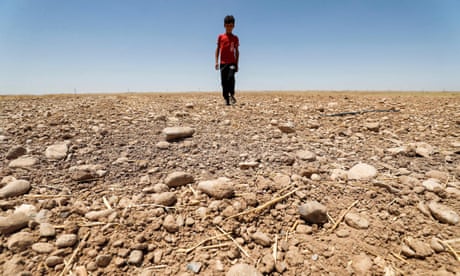Growing climate anxiety poses significant threat to individuals and society

Levels of eco-anxiety—the chronic fear of environmental doom—are growing, particularly among children and young people, and are likely to be significant and potentially damaging to individuals and society, warn experts in The BMJ today.
Mala Rao and Richard A Powell say neglecting the effects of increasing eco-anxiety "risks exacerbating health and social inequalities between those more or less vulnerable to these psychological impacts," while the socioeconomic effects—as yet hidden and unquantified—"will add considerably to the national costs of addressing the climate crisis."
And they call on leaders to "recognize the challenges ahead, the need to act now, and the commitment necessary to create a path to a happier and healthier future, leaving no one behind."
They point to a 2020 survey of child psychiatrists in England showing that more than half (57%) are seeing children and young people distressed about the climate crisis and the state of the environment.
And a recent international survey of climate anxiety in young people aged 16 to 25 showed that the psychological (emotional, cognitive, social, and functional) burdens of climate change are "profoundly affecting huge numbers of these young people around the world."
These findings also offer insights into how young people's emotions are linked with their feelings of betrayal and abandonment by governments and adults, they write. Governments are seen as failing to respond adequately, leaving young people with "no future" and "humanity doomed."
So what is to be done to alleviate the rising levels of climate anxiety, they ask?
"The best chance of increasing optimism and hope in the eco-anxious young and old is to ensure they have access to the best and most reliable information on climate mitigation and adaptation," they explain.
"Especially important is information on how they could connect more strongly with nature, contribute to greener choices at an individual level, and join forces with like-minded communities and groups."
They conclude: "The climate crisis is an existential threat, and fearfulness about the future cannot be fully tackled until a common united global strategy is put in place to address the root cause, global warming, and to give everyone—especially the young and the most vulnerable communities—the hope of a better future."Government inaction on climate change linked to psychological distress in young people
More information: The BMJ, blogs.bmj.com/bmj/2021/10/06/t … -rise-of-eco-anxiety
Provided by British Medical Journal
‘Eco-anxiety’: fear of environmental doom weighs on young people
Although not a diagnosable condition, experts says climate anxiety is on the rise worldwide
In September children and young people around the world, including Glasgow, took part in protests against the climate crisis. Photograph: Jeff J Mitchell/Getty Images
Wed 6 Oct 2021 23.30 BST
The climate crisis is taking a growing toll on the mental health of children and young people, experts have warned.
Increasing levels of “eco-anxiety” – the chronic fear of environmental doom – were likely to be underestimated and damaging to many in the long term, public health experts said.
Writing in the British Medical Journal, Mala Rao and Richard Powell, of Imperial College London’s Department of Primary Care and Public Health, said eco-anxiety “risks exacerbating health and social inequalities between those more or less vulnerable to these psychological impacts”.
Although not yet considered a diagnosable condition, recognition of eco-anxiety and its complex psychological effects was increasing, they said, as was its “disproportionate” impact on children and young people.
In their article, they pointed to a 2020 survey of child psychiatrists in England showing that more than half (57%) are seeing children and young people distressed about the climate crisis and the state of the environment.

Children set for more climate disasters than their grandparents, research shows
A recent international survey of climate anxiety in young people aged 16 to 25 showed that the psychological burdens of climate crisis were “profoundly affecting huge numbers of these young people around the world”, they added.
Rao and Powell called on global leaders to “recognise the challenges ahead, the need to act now, and the commitment necessary to create a path to a happier and healthier future, leaving no one behind”.
Research offered insights into how young people’s emotions were linked with their feelings of betrayal and abandonment by governments and adults, they said. Governments were seen as failing to respond adequately, leaving young people with “no future” and “humanity doomed”.
Their warning comes a week after Greta Thunberg excoriated global leaders, dismissing their promises to address the climate emergency as “blah, blah, blah”.
In April, she quoted Boris Johnson, who derisively used the phrase “bunny hugging” to describe climate activism. Thunberg said: “This is not some expensive, politically correct, green act of bunny hugging”.
By 2030 carbon emissions are expected to rise by 16%, according to the UN, rather than fall by half, which is the cut needed to keep global heating under the internationally agreed limit of 1.5C
Protest in a pandemic: voices of young climate activists – video
Rao and Powell said it was important to consider what could be done to alleviate the rising levels of climate anxiety.
“The best chance of increasing optimism and hope in the eco-anxious young and old is to ensure they have access to the best and most reliable information on climate mitigation and adaptation,” they said. “Especially important is information on how they could connect more strongly with nature, contribute to greener choices at an individual level, and join forces with like-minded communities and groups.”
Separately, new research also published in the BMJ suggests changing unhealthy behaviour could be key to achieving net zero greenhouse gas emissions by 2050.
Theresa Marteau, of the University of Cambridge, said technological innovation alone would be insufficient.
Adopting a largely plant-based diet and taking most journeys using a combination of walking, cycling and public transport would substantially reduce greenhouse gas emissions and improve health, she said.
No comments:
Post a Comment